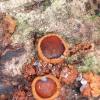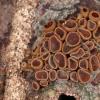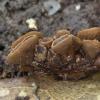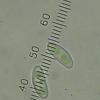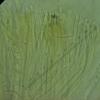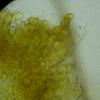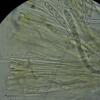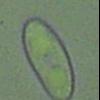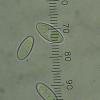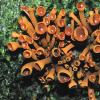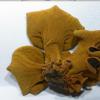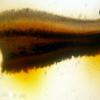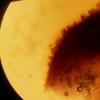
19-02-2026 13:50
Margot en Geert VullingsWe found this collection on deciduous wood on 7-2-

16-02-2026 21:25
 Andreas Millinger
Andreas Millinger
Good evening,failed to find an idea for this fungu

08-12-2025 17:37
 Lothar Krieglsteiner
Lothar Krieglsteiner
20.6.25, on branch of Abies infected and thickened

17-02-2026 17:26
 Nicolas Suberbielle
Nicolas Suberbielle
Bonjour à tous, Je recherche cette publication :

15-02-2026 04:32
One more specimen that is giving me some descent a

17-02-2026 13:41
Isabelle CharissouBonjour, est-ce que quelqu'un pourrait me fournir

16-02-2026 18:34
 Thierry Blondelle
Thierry Blondelle
Bonjour,La micro de cet anamorphe de Hercospora su
Tropical asco
Zuzana Sochorová (Egertová),
23-02-2016 20:39
 Hello,
Hello,I don´t know where to place this pretty fungus from Brunei (Borneo).
It grew in clusters on a dead branch of unknown deciduous tree in a tropical rainforest, about 280 m asl.
Fruitbodies truncate-conical, 1.5-9 mm broad, 1.5-5.5 mm high. Hymenium brownish-red, slightly concave. Outer surface rusty-brown, granulate. Flesh beige.
Asci 100-142 x 6.5-8 micrometers, cylindrical, non-amyloid, octosporic, uniseriate.
Spores (from sporeprint) 8.8-12 x 3.5-5 micrometers, smooth, hyaline, ellipsoid, often somewhat asymmetrical, sometimes slightly bent, containing two guttules (2-2.5 micrometers).
Paraphyses 1.8-2.5 micrometers broad in the middle, septate, straight, apex obtuse, 3-4.5 micrometers broad, terminal cell 30-58 micrometers long.
Excipulum textura intricata, hyphae 2-3 micrometers broad.
The granules on the outer surface are made of thick-walled golden yellow, shortly cylindric, globose or pyriform cells, 10-16 x 5-10 micrometers.
Zuzana
Nicolas VAN VOOREN,
23-02-2016 21:10

Re : Tropical asco
It looks like Encoelia heteromera.
Zuzana Sochorová (Egertová),
23-02-2016 21:14

Re : Tropical asco
Super, thanks a lot!
Till Lohmeyer,
24-02-2016 08:50
Re : Tropical asco
Bonjour, Zuzana
yes, indeed, as Nicolas wrote, Encoelia heteromera is a good idea for your collection ... although the species has hitherto been reported mainly from Central and South America. When Arendholz & Sharma (Mycotaxon 20,2,1984: 642ff.) published a find from India they did so by saying: "This seems to be the first report outside this region". However, their description deviates in some respects (Asci J+, ascospores 7,5-10 x 2-3um) from what is known about E. heteromera in Latin America. I wonder if yours isn't perhaps the first "true" collection from Asia?
I have never found the fungus myself, but I have studied a sample collected by my friend Christoph Hahn in Colombia in 1996.
Kind regards
Till
yes, indeed, as Nicolas wrote, Encoelia heteromera is a good idea for your collection ... although the species has hitherto been reported mainly from Central and South America. When Arendholz & Sharma (Mycotaxon 20,2,1984: 642ff.) published a find from India they did so by saying: "This seems to be the first report outside this region". However, their description deviates in some respects (Asci J+, ascospores 7,5-10 x 2-3um) from what is known about E. heteromera in Latin America. I wonder if yours isn't perhaps the first "true" collection from Asia?
I have never found the fungus myself, but I have studied a sample collected by my friend Christoph Hahn in Colombia in 1996.
Kind regards
Till
Hans-Otto Baral,
24-02-2016 10:37

Re : Tropical asco
Hi all
Surely, E. heteromera must be inamyloid. But your collection looks different from what I know from Central America (the first below is photographed by Robert Lücking). Mainly the stalk is less conspicuous. And what is this stroma around the apothecia? Is it the anamorph?
You should test KOH for the ionomidotic reaction.
Zotto
Surely, E. heteromera must be inamyloid. But your collection looks different from what I know from Central America (the first below is photographed by Robert Lücking). Mainly the stalk is less conspicuous. And what is this stroma around the apothecia? Is it the anamorph?
You should test KOH for the ionomidotic reaction.
Zotto
Zuzana Sochorová (Egertová),
24-02-2016 17:43

Re : Tropical asco
Thank you, Till and Zotto.
It´s true my apothecia have very different shape from those from Central America.
After adding KOH, there appeared a rusty stripe coming out from the preparate. I was too slow to catch it in the photo, the picture tries to show how it looked little bit later (ochre outline around the section).
Best regards,
Zuzana
It´s true my apothecia have very different shape from those from Central America.
After adding KOH, there appeared a rusty stripe coming out from the preparate. I was too slow to catch it in the photo, the picture tries to show how it looked little bit later (ochre outline around the section).
Best regards,
Zuzana
Hans-Otto Baral,
24-02-2016 18:14

Re : Tropical asco
Yes, probably ionomidotic as mine.
I think this would be worth a sequence and hope that Kadri would be interested in doing it. We have several from E. heteromera, but I think all from the new world.
I think this would be worth a sequence and hope that Kadri would be interested in doing it. We have several from E. heteromera, but I think all from the new world.

